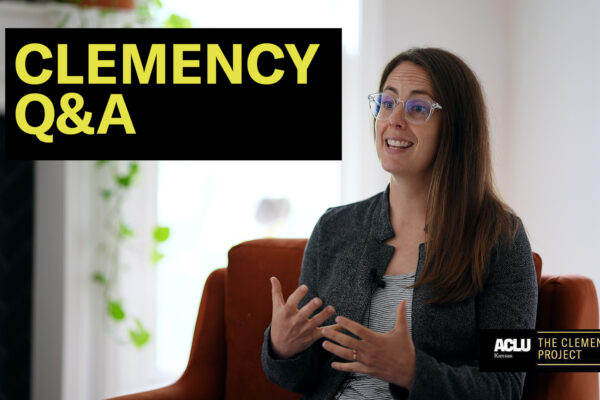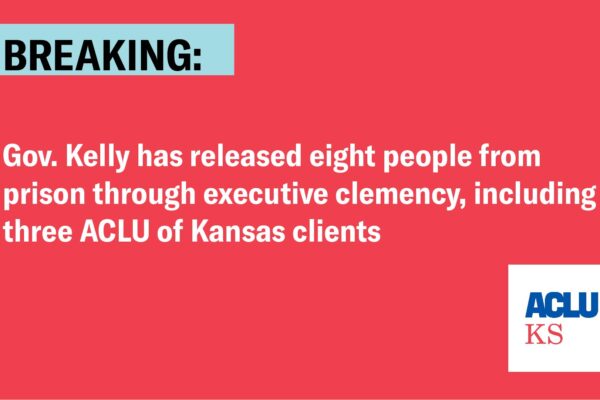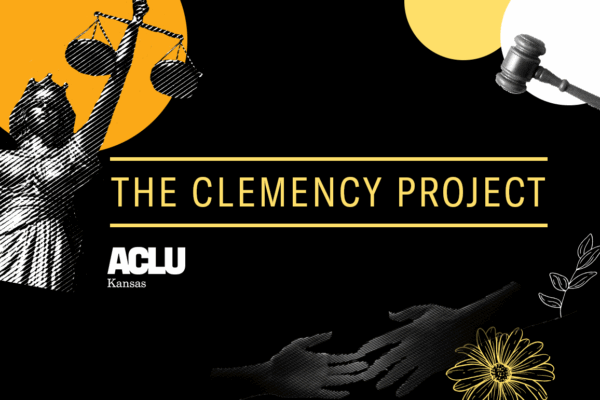OVERLAND PARK, KS --- In a historic move the ACLU of Kansas hopes will normalize the use of executive clemency, Governor Laura Kelly today released three affiliate clients from various state prisons via commutation.
The ACLU of Kansas placed this issue on the state’s radar, representing three of the eight people in total who were released or pardoned, and having filed 108 clemency applications of the over 200 total awaiting review. The affiliate hopes these releases mark a new beginning. Governors typically make such moves near the end of their terms.
“Clemency should be a regularly utilized executive power,” said ACLU of Kansas Executive Director Nadine Johnson. “It shouldn’t be about situational courage or political favors. On behalf of our clients and the other people now reunited with their families, we thank Governor Kelly for taking this bold step forward.”
The Governor’s use of her clemency powers offers a statement about the power of redemption. Clemency offers an important, systemic safety valve for the governor to address injustices directly throughout their term.
Johnson hopes this action will mark a broader shift in systemic reform.
“We’re thrilled for the people who were released, and at the same time, we recognize the dire need for reform of the opaque, bureaucratic process they navigated,” Johnson said. “There is ample opportunity to build upon today’s action. Let’s make that happen.”
Governor Kelly said during her campaign that there are people sitting in prison who should not be there. Today’s move demonstrates how clemency can be used to correct harsh sentences, protect ill inmates and extend grace to people enmeshed in an unjust prison system.
The ACLU of Kansas’ Clemency Project, launched in spring 2020, sought to change the way we think about the people languishing under unduly harsh sentences in Kansas’ chronically over-populated prisons.
“Clemency is not about who you were, but about what you’re now deserving of,” said Sharon Brett, legal director of the ACLU of Kansas. “Our clients are far more than their convictions.”
Among those released include our clients:
Dominic Holder, a 26-year-old father, incarcerated in a minimum-security unit for a non-violent drug offense. Dominic was active inside of prison, working 10-hours days at a manufacturing job and completing the Department of Corrections’ Decision Point Program and the 24:7 DAD program. Dominic also co-directed the African American Awareness Program and was active in the facility’s Reaching Out from Within program. Dominic plans to reunite with his partner and daughter in Indiana and use his skills and leadership experiences to find work. He also wants to help others with the transition from prison to community life.
Joseph Jones, 24, was incarcerated in a minimum-security unit. Prior to the COVID-19 pandemic, Joseph had a full-time work release job at a furniture store. He stands just a semester away from earning a Bachelor’s degree in Business Administration. He assists other inmates with their resumes, studies and leads a Bible study group, and plans to move to Houston to live with his mom, finish his degree, find a job in database management, and start his MBA.
Mike McCloud, 67, was incarcerated in 1990 for a string of robberies, and spent roughly the next 26 years repaying the $7,000 he stole. Mike was released in 2018 when a judge ran consecutive sentences concurrently, but the Johnson County DA successfully challenged that ruling, meaning Mike would eventually have to return to prison and serve another 20-plus years. Had Mike been sentenced today instead of 1990, his sentence would be half of what he’s already served. Mike plans to continue the quiet life he established with his partner since his release, living with his partner, fishing, walking his dog, and enjoying the truck he saved up for in prison to buy.
Prior to the Governor’s action, Chris McIntyre was the only one of the ACLU’s Clemency Project clients who had been released from prison. Chris was released through the functional incapacitation process, which is run by the Kansas Department of Corrections and is a process separate from clemency. He passed away recently, surrounded by family.
Kansans interested in applying for clemency for themselves or on behalf of a loved one can do so using the ACLU of Kansas’ clemency toolkit, available online.
# # #
About the ACLU of Kansas: The ACLU of Kansas is the statewide affiliate of the national American Civil Liberties Union. The ACLU of Kansas is dedicated to preserving and advancing the civil rights and legal freedoms guaranteed by the United States Constitution and the Bill of Rights. For more information, visit our website at www.aclukansas.org.
Related Content

Clemency Q&A with Sharon Brett, Legal Director
Stay Informed
Sign up to be the first to hear about how to take action.
By completing this form, I agree to receive occasional emails per the terms of the ACLU’s privacy statement.
By completing this form, I agree to receive occasional emails per the terms of the ACLU’s privacy statement.



